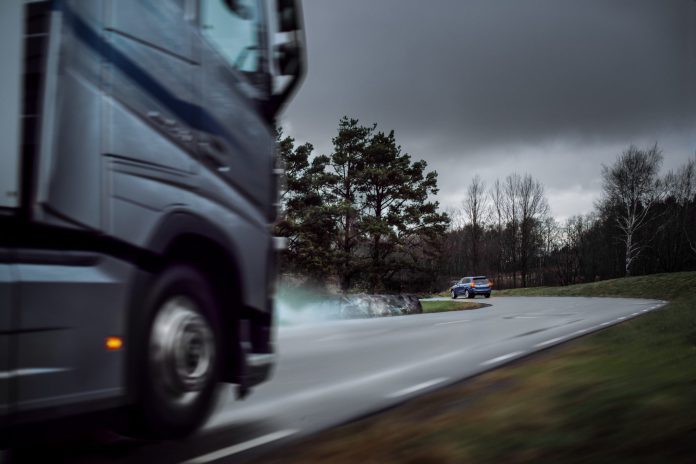Volvo Cars and Volvo Trucks will share anonymised safety data between connected vehicles in Sweden and Norway in real time before the year is out, the pair have announced. Volvo Cars has also announced deeper integration of Google apps and services in its new infotainment system, and a deal with Amazon to allow in-car deliveries of Prime parcels.
The arrangement with Volvo Trucks marks another staging post on the road to intelligent transport systems and autonomous vehicles. The collaboration is the first step towards achieving a critical mass of connected vehicles that could impact on overall traffic safety, according to Volvo Cars.
It is the first time the car maker, separated from the Volvo Group in 1999 and now under Chinese ownership, is sharing safety related data with another company, it said.
The arrangement will see Volvo trucks, sold in Sweden and Norway from later this year, fitted with Volvo Cars’ Hazard Light Alert technology, which has been available on a number of models in the two markets since 2016. The cloud-based technology alerts Volvo drivers when nearby Volvo vehicles switch on their hazard lights, warning them of incidents ahead.
Adding selected Volvo trucks to the cloud will cover more area, identify more potential hazards and boost overall traffic safety. Both brands represent a considerable portion of new vehicle registrations in the region, noted Volvo Cars.
“The more vehicles we have sharing safety data in real time, the safer our roads become. We look forward to establishing further collaborations with other partners who share our commitment to traffic safety,” said Malin Ekholm, vice president of the Volvo Cars Safety Centre.
“Connected safety allows Volvo drivers to virtually ‘see around the corner’ and avoid a critical situation or accident before it happens. The ability to see further ahead and avoid hazards is something we want to share with as many drivers as possible.”
Volvo Cars was sold to Ford in 1999, and to Chinese automotive group Geely in 2010. The company has been at the forefront of the tech revolution in the automotive space.
In parallel to the deal with Volvo Trucks, it has announced plans to further embed Google apps and services into its connected vehicles. Its incoming Sensus infotainment system, based on the Android operating system, will incorporate Google Assistant, Google Play Store and Google Maps as standard, it said.
Subscribe now to get the daily newsletter from RCR Wireless News
Software updates will be available in real-time, it said, allowing it to offer drivers up-to-date information and predictive services.
Meanwhile, the company has also announced a partnership with Amazon to bring in-car delivery of packages in Volvo cars in 37 cities in the US; Amazon Prime customers can arrange for delivery of parcels to their vehicles, even when they are absent from the scene. “This mix of car and commerce is starting the next wave of innovation and we intend to be at the forefront,” said Atif Rafiq, chief digital officer at Volvo Cars.
The Chinese-owned car maker signed a non-exclusive framework deal with Uber late last year to sell “tens of thousands” of autonomous XC60-based models to the ride-sharing services between 2019 and 2021. Volvo has set a timeline to release its own autonomous XC60 by 2021. It said at the time the Uber deal marked “the convergence of car makers and Silicon Valley-based technology companies.”
Volvo Cars president and chief executive Håkan Samuelsson remarked: “The automotive industry is being disrupted by technology and Volvo Cars chooses to be an active part of that disruption. Our aim is to be the supplier of choice for autonomous ride-sharing service providers globally.”
The company has stated it wants electric vehicles to make up at least 50 per cent of its sales by 2025. All new models released from 2019 will be available as either a mild hybrid, plug-in hybrid or battery electric vehicle.
Its strategy is intended to consolidate its position in China, its single biggest market, where it passed 100,000 sales for the first time last year. The Chinese government plans to have new-energy vehicles account for more than 20 per cent of the country’s annual car sales, or around seven million vehicles, in the same timeframe.
“China’s electric future is Volvo Cars’ electric future,” said Samuelsson.
Meanwhile, British maker Rolls-Royce said last month autonomous ships will be a reality before either robot aircraft or driverless cars, despite the maritime industry’s late start with digital technologies. The British engine maker said it will test autonomous tug boats in port waters along the Finnish coast this summer.

